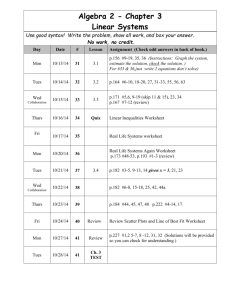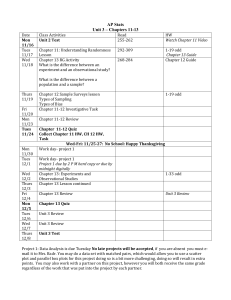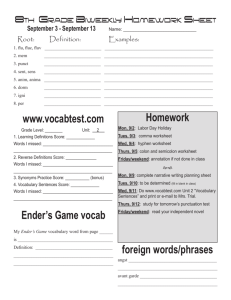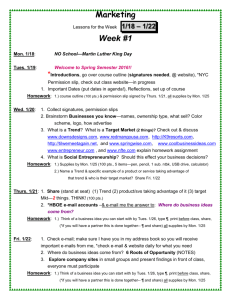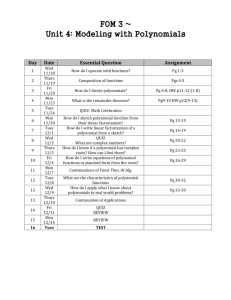File
advertisement
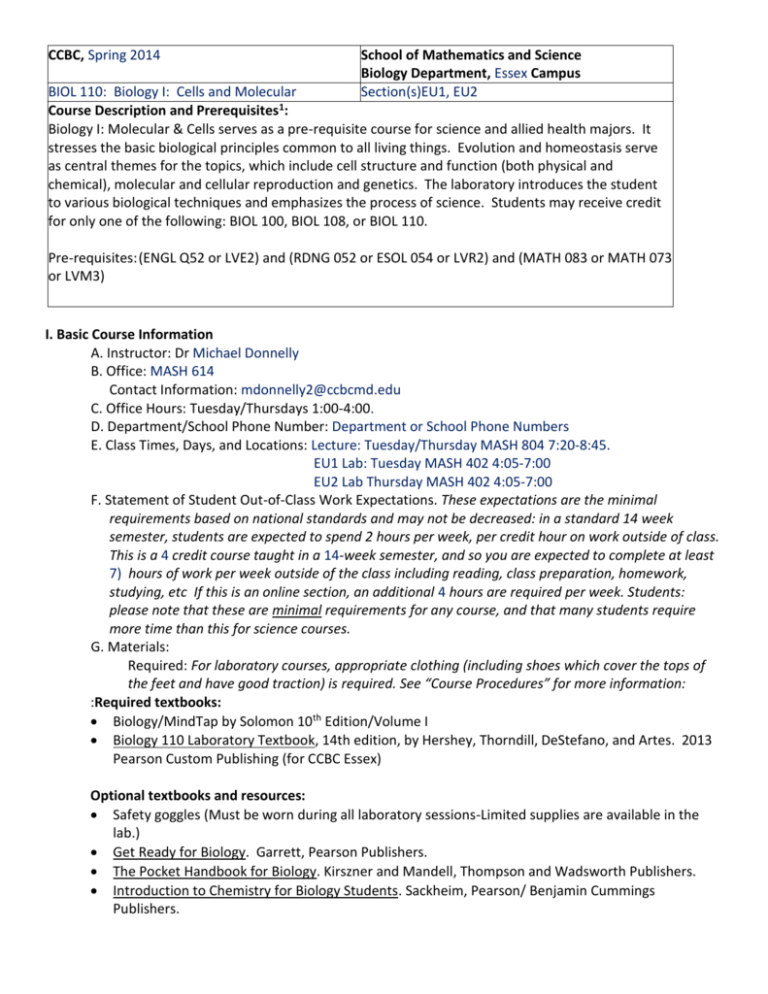
CCBC, Spring 2014 School of Mathematics and Science Biology Department, Essex Campus Section(s)EU1, EU2 BIOL 110: Biology I: Cells and Molecular Course Description and Prerequisites1: Biology I: Molecular & Cells serves as a pre-requisite course for science and allied health majors. It stresses the basic biological principles common to all living things. Evolution and homeostasis serve as central themes for the topics, which include cell structure and function (both physical and chemical), molecular and cellular reproduction and genetics. The laboratory introduces the student to various biological techniques and emphasizes the process of science. Students may receive credit for only one of the following: BIOL 100, BIOL 108, or BIOL 110. Pre-requisites: (ENGL Q52 or LVE2) and (RDNG 052 or ESOL 054 or LVR2) and (MATH 083 or MATH 073 or LVM3) I. Basic Course Information A. Instructor: Dr Michael Donnelly B. Office: MASH 614 Contact Information: mdonnelly2@ccbcmd.edu C. Office Hours: Tuesday/Thursdays 1:00-4:00. D. Department/School Phone Number: Department or School Phone Numbers E. Class Times, Days, and Locations: Lecture: Tuesday/Thursday MASH 804 7:20-8:45. EU1 Lab: Tuesday MASH 402 4:05-7:00 EU2 Lab Thursday MASH 402 4:05-7:00 F. Statement of Student Out-of-Class Work Expectations. These expectations are the minimal requirements based on national standards and may not be decreased: in a standard 14 week semester, students are expected to spend 2 hours per week, per credit hour on work outside of class. This is a 4 credit course taught in a 14-week semester, and so you are expected to complete at least 7) hours of work per week outside of the class including reading, class preparation, homework, studying, etc If this is an online section, an additional 4 hours are required per week. Students: please note that these are minimal requirements for any course, and that many students require more time than this for science courses. G. Materials: Required: For laboratory courses, appropriate clothing (including shoes which cover the tops of the feet and have good traction) is required. See “Course Procedures” for more information: :Required textbooks: Biology/MindTap by Solomon 10th Edition/Volume I Biology 110 Laboratory Textbook, 14th edition, by Hershey, Thorndill, DeStefano, and Artes. 2013 Pearson Custom Publishing (for CCBC Essex) Optional textbooks and resources: Safety goggles (Must be worn during all laboratory sessions-Limited supplies are available in the lab.) Get Ready for Biology. Garrett, Pearson Publishers. The Pocket Handbook for Biology. Kirszner and Mandell, Thompson and Wadsworth Publishers. Introduction to Chemistry for Biology Students. Sackheim, Pearson/ Benjamin Cummings Publishers. II. Course Goals Overall A. Course Objectives1: Upon completion of this course, students will be able to: 1. apply the principles and assumptions that underlie scientific information and apply the scientific method to simulated problem-solving situations; 2. recognize and use metric units of measurement and perform basic calculations using metric units of measurement; 3. follow detailed directions to demonstrate the appropriate use of laboratory equipment to gather and analyze data; 4. organize data into tables or graphs (where appropriate) and be able to draw inferences from the graphs; 5. demonstrate the proper use of a light microscope; 6. apply chemical principles to the functioning cell; 7. explain how a cell is the basic unit of life including the function of organelles; 8. explain the principles of bioenergetics, including the processes of photosynthesis, aerobic respiration and fermentation; 9. explain how living organisms store and process genetic information to control their life functions and activities; 10. compare and contrast asexual and sexual reproduction; 11. solve genetic problems involving simple Mendelian traits, incomplete dominance, codominance and sexlinked traits; 12. apply the principles of genetics to explain how ethnic diversity applies in the areas of genetic inheritance and disorders; 13. determine the relevancy of biotechnological advances to your life; and 14. explain the basic process for evolution in terms of variation, over production and natural selection B. Major Topics1: 1. Chemistry of life 2. Characteristics and classification of life (Microscopy) 3. Cell types, structures and functions 4. Cell membrane structure and function 5. Cellular metabolism (including enzymes, photosynthesis and cellular respiration 6. Cellular reproduction (including DNA, mitosis and meiosis 7. Molecular genetics (including transcription and translation) 8. Classical genetics 9. Evolution 10. Biotechnology 11. The process of science (Metric system of measurement and lab skills including the proper use of scientific equipment) C. Rationale: This course can be used to meet the General Education requirement of a four-credit course in the science domain for general education. This course is intended for pre-allied health and science majors. Non-science majors should take BIOL 108. NOTE: Students may receive General Education credit for only one of the following courses: BIOL 100, BIOL 108, BIOL 110. III. Evaluation A. Requirements1: This course will include three lecture exams and a cumulative final exam. In addition, there will be several quizzes and written assignments. There will be two lab practical exams. The dates of the exams and lab practicals are reflected in the class schedule. B. Instructor's grading policy: Course evaluation is based upon the premise that a student's regular attendance and ability to answer test and practical examination questions is an approximation of that student's mastery of the specific course objectives. Exam questions are designed to objectively measure both the scope and depth of the student's mastery. The instructor will assign letter grades based on the following calculation: Exams (3 @ 125 pts each): Final Exam (Cumulative) : Lecture Quizzes (10@10 pts each): Written Assignments : GREAT Assignment: Lab Practicals (2 @ 50 pts each): Lab Reports (10 @ 5 pts each): Pre-lab Quizzes (10 @ 5 pts each): Total Points: 375 points 175 points 100 points 100 points 50 points 100 points 50 points 50 points 1000 points Final grades will be assigned as specified below: Points Earned Letter Grade 900 – 1000 A 800 – 899.9 B 700 – 799.9 C 600 – 699.9 D Less than 600 F Please note: You must earn a passing grade (60%) in both portions of the course (i.e. at least 450 points in lecture and 150 points in lab) to pass the course as a whole. That is, if you fail the lab, you also fail the course. C. Instructor's attendance policy: Participation in all laboratories is mandatory. Failure to attend two labs will result in failure of the course. No make-up labs will be given. If you miss a lab, you need to make arrangements to attend another lab section during the same week. Allowing you to attend a different laboratory section is at the discretion of that lab’s instructor and APPROVAL IS NOT GUARENTEED! Regardless, you will be held responsible for any and all material that you missed in lab. Open labs may not be available for making up labs. Even if an open lab is available, the lab must be made up in the same week in which the lab occurred. Exams may be made up with a legitimate excuse and documentation (Illness, Jury Duty, etc). If you know you are going to miss in advance you may take the exam early. Quizzes can be made up the next class. Lab Practicals cannot be made up. D. Instructor’s audit policy: Important notes: (1) you can no longer wait until mid-semester to decide that auditing a course is appropriate: the final date to change to an audit now coincides with the final date for withdrawing with a 50% refund, and (2) failure to participate in the class as follows will result in a grade of “W” instead of “AU.”The last day to switch to an audit for the Spring 2015 semester is: February 23, 2015. IV. Course Procedures A. Course-related policies and procedures (including course-specific links): B. College wide syllabus policies: For college wide syllabus policies such as the Code of Conduct related to Academic Integrity and Classroom Behavior or the Audit/ Withdrawal policy, please go to the ‘MySyllabiPolicies’ Tab on the MyCCBC page. Please pay particular attention to the following sections of MySyllabiPolicies: Attendance Policy Code of Conduct for Academic Integrity Grades -W (The last day to withdraw this semester is: Thursday, April 2, 2015.) C. Contact information for course-related concerns: See endnote for contact information2. D Additional Procedures: No food or drink is allowed in any science lab at any time. Feet should be covered with closed-toed shoes to provide protection from broken glass, spilled chemicals, and other laboratory hazards. Adequate protective clothing is required in the Biology 110 laboratories. This includes closed toed shoes, long pants, covering at least to the knees, and short-sleeved shirts with no bare midriffs (in other words, you must be covered shoulders to knees). If you prefer to purchase a lab coat, you may do so at the bookstore. Additional eye, hand, skin and clothing protection may be required when chemical or biological hazards are present. Failure to abide by laboratory safety policies will result in removal of students from the class. E. Course calendar/schedule: See the printed schedule appended to this document. Note that the content in these sections is dictated by the Common Course Outline for this course, as approved at the college-wide level: [http://www.ccbcmd.edu/cco/home.html] 2 Students should first attempt to take concerns to the faculty member. If students are unable to resolve course-related concerns with the instructor, they should contact Ms. Christine DeStefano, Biology Department Chair, at cdestefano@ccbcmd.edu or 443-840-2673. Week 2/3 2/10 2/17 2/24 3/3 3/10 3/17 3/24 3/31 4/14 4/21 4/28 5/5 Day/ date Tues Thurs Tues 1 2 3 Thurs Tues Thurs Tues Thurs Tues Thurs 3 4 4 Tues Thurs Tues Thurs Tues Thurs Tues Thurs Tues Thurs Tues Thurs Tues Thurs Tues Thurs Tues 5/12 5/21 Chapter Thurs Thurs 5 5 6 7 8 8 9 9 10 10 11 11 12 12 13 13 15 15 16 16 Topic A View of Life Atoms and molecules: The Chemical Basis of Life Atoms and molecules: The Chemical Basis of Life The Chemistry of Life: Organic compounds The Chemistry of Life: Organic compounds Organization of cell Organization of the cell Biological Membranes Exam 1: Chapters 1-4 Biological Membranes Cell Communication (Selected topics/Reception) Energy and Metabolism How cells make ATP: Energy-Releasing Pathways How cells make ATP: Energy-Releasing Pathways Photosynthesis Photosynthesis Chromosomes, Mitosis, and Meiosis Exam 2: Chapters 5-9 Chromosomes, Mitosis, and Meiosis Basic Principles of Hereditary Basic Principles of Hereditary DNA: The carrier of genetic information DNA: The carrier of genetic information Gene Expression Gene Expression Exam 3: Chapters 10-13 DNA technology and genomics DNA technology and genomics Human Genetics and the Human Genome Human Genetics and the Human Genome Chapters 15 and 16 to be included in cumulative final exam. Review Cumulative Final Exam (7:30-9:30) Exam/ quizzes Q Q Q E Q Q Q E Q Q Q E Q Q E Fall 2014 Lab Schedule Lab # Lab # Mon 2/2Thursday 2/5 1 Lab Safety/Introduction to Metric Measurements & Lab Equipment Read: (1) BIO LAB REGS & (2) REGS FOR MICROSCOPE USE & CARE View Safety Presentation, Take Quiz & Sign Acknowledgement/Agreement Sheet Mon 2/9Thursday 2/12 2 pH, Fast Plants & Introduction to Molecular Structure [Plant Seeds in Quads (2 seeds/section; 8 seeds total/group) for Lab#12] Mon 2/16Thursday 2/19 3 Molecular Structure II [Observe/POLLINATE/Record Observationsfor Lab#12] Mon 2/23Thursday 2/26 4 Chemical Composition of Cells [Observe/POLLINATE/Record Observationsfor Lab#12] Mon 3/2Thursday 3/5 5 The Microscope & Cells [Observe/POLLINATE/Record Observationsfor Lab#12] Mon 3/9Thursday 3/12 6 Movement of Molecules & Ions/Surface Area-to-Volume Ratio [Observe/POLLINATE/Record Observationsfor Lab#12] Mon 3/16Thursday 3/19 Test Lab Practical #1 (Safety and Labs 1-6) [Observe/POLLINATE/Record Observationsfor Lab#12] Mon 3/23Thursday 3/26 7 Enzyme Activity [Observe/POLLINATE/Record Observationsfor Lab#12] Mon 3/30Thursday 4/2 8 & Handout & 9 METABOLISM: Yeast Respiration/Fermentation & Photosynthesis/Respiration Handout & Photosynthesis Note: All 3 will remain available the Saturday after the break. [Observe/POLLINATE/Record Observationsfor Lab#12] Date Fri 4/3Sun 4/12 Spring recess Friday, April 3- Sunday, April 12 Mon 4/13Thursday 4/16 8 & Handout & 9 METABOLISM: Yeast Respiration/Fermentation & Photosynthesis/Respiration Handout & Photosynthesis Note: All 3 will remain available the Saturday after the break. [Observe/POLLINATE/Record Observationsfor Lab#12] Mon 4/20Thursday 4/23 10 Distribution of Chromosomes: Mitosis & Meiosis (may be on cart) [Harvest & Plant seeds on filter paper in petri dish-put container on plant cart for Lab 12] Mon 4/27Thursday 4/30 12 & Fly(opt) Inherited Traits (Option 1): Make predictions, observe results, calculate chi square & do problems; & BioLab Fly (on laptops-optional) Mon 5/4Thursday 5/7 11 & 14 DNA "Fingerprinting & The Genetic Code Mon 5/11Thursday 5/14 Test Lab Practical 2 Labs 7-13 Mon 5/18Sat 5/23 LECTURE FINAL EXAMS


